
Movie stars Arnold Schwarzenegger, Sylvester Stallone, Chuck Norris, Bruce Willis and Jason Statham are actually in Bulgaria for the shooting of the "The Expendables 2" at the Nu Boyana Film Studios.
Bodyguard services are provided by a Bulgarian security firm connected to the most powerful local organized crime group TIM, according to secret cables sent from the US Embassy in Sofia and published by Wikileaks.
Pictures taken during Schwarzenegger's arrival at the Sofia International Airport, published in Bulgarian media, show a Mercedes SUV, waiting for the actor, with license plate C4401XA, registered to a company owned by the Varna-based TIM and commonly used by the TIM boss Ivo Kamenov. According to unconfirmed reports, the SUV is armored to the 7b level, which is very rare in Bulgaria.
Another picture portrays kick boxer Todor Todorov standing close to Schwarzenegger. Todorov is a competitor of the TIM sports club and a bodyguard, employed by the Sark Group company, founded in 2004 by the former chief of security of TIM boss Marin Mitev.
The security activities of TIM are spread among several firms with the most popular one being TIM EOOD, offering VIP security services in Bulgaria and abroad, according to the official internet page tim.bg.
The Nu Boyana studios, contacted by bivol.bg, have declined giving information about the company providing security for Hollywood stars, shooting in Sofia, and in particular for Schwarzenegger.
TIM - "The up-and-coming star of Bulgarian organized crime"
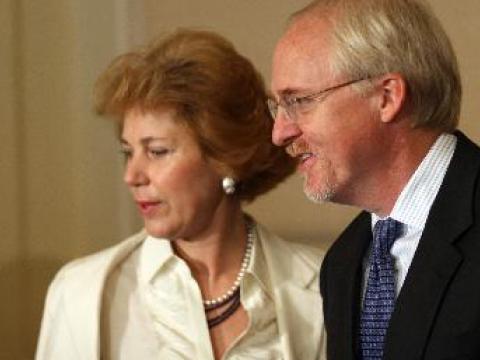
A secret diplomatic cable [08SOFIA185], released by Wikileaks and dated March 27, 2008, reveals that Bulgarian Ambassador in Washington, DC, now serving a second term there, Elena Poptodorova and then Deputy Defense Minister, Sonya Yankulova, have informed American Ambassador in Sofia John Beyrle about plans to increase the Bulgarian contingent in Kandahar by fifty rangers, months before the official decision of the Bulgarian cabinet.
The cable is also shading light on the steady pressure exerted by US officials on the Government of Bulgaria to expand its Afghan contribution with new contingent.
In two separate meetings, Poptorova and Yankulova have stressed to Beyrle that this had been sensitive information while the diplomat wrote in the cable, classified as secret, that both ladies must be under a strictly protect status.
"Bulgaria is set to announce a decision to deploy an additional 50 soldiers to take over the Entry Control Point Number Four mission at Kandahar Airfield. It is keeping this decision under tight wraps for now. We expect the formal decision will be made just before the NATO Summit, and the announcement itself probably in Bucharest by the Prime Minister. Both Ambassador Poptodorova in Washington and Deputy Defense Minister Yankulova (strictly protect) have foreshadowed this outcome and the sensitivity of the decision and announcement timing," Beyrle informs in his report.
"While a formal decision is still days off, and there is still some scope for a mis-step, we would be surprised if Bulgaria does not come through," the Ambassador concludes.

Bulgarian Prime Minister, Boyko Borisov, in an interview for the political TV show “Face to Face” with host, Tsvetanka Rizova, September 4, 2011. (Video here):
TR: There was information, released by WikiLeaks, showing your position on GMO had been quite hypocritical.
BB: Released by whom?
TR: Hmm, I don’t know if you are aware that your ministers went to…
BB: I do not read them.
TR: Well, let me tell you. Your ministers…
BB: I do not read them.
TR: Your ministers went there and have said that due to public pressure we will not plant GMO crops, but otherwise we want them and count on Europe to make us do it.
BB: I think that…
TR: What are our guarantees that you are sincere when it comes to the environment?
BB: (thinking) What minister went there?
TR: Miroslav Naydenov (Agriculture Minister) is cited there.
BB: I asked him; he said he did not go. And he did not discuss any such matter.
...
BB: And about GMO… The way you presented it, it looks like someone had been a hypocrite.
TR: Yes, this is how it looks like, according to WikiLeaks; it was simply hypocritical.
BB: Who is WikiLeaks?
TR: How come, who is WikiLeaks? (BB: Who does it represent; who decides…) The ones who release the cables…no one has denied these cables so far.
BB: Yes, because no one wants to deal with them, because once they start denying them…
TR: Don’t you think that if this was a lie, there would have been some official statement? Everyone keeps quiet; it means they are true.
BB: If they were true, they would have published them all, from A to Z, not selectively, to choose and release depending on when and what is convenient… in connection…I am talking about those on Bulgaria.
TR: We must come to conclusion now.
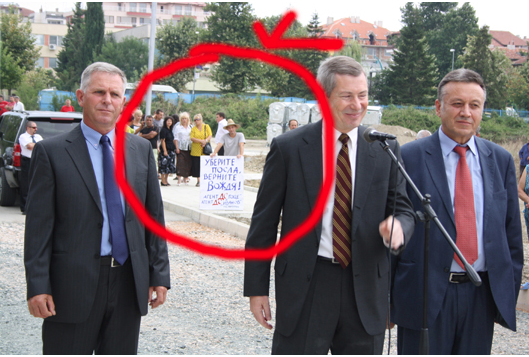
Your Excellency,
One year ago you were opening a bridge connecting the Roma district in Tsarevo with the rest of the Black Sea town.
You were standing among the audience next to the town’s Mayor, Petko Arnaudov, and Regional Governor, Konstantin Grebenarov. Both are former members of a party, declared criminal by current Bulgarian legislation – the Bulgarian Communist Party, and are agents of the macabre Communist State Security, DS.
I stood behind you with a large portrait of Lenin. The following message was written on its back: “Уберите посла, верните Вождя. Агент ДС “Гоце” и Агент ДС “Иванов” град Мичурин” (In Russian, meaning “Take away the Ambassador, bring back the Leader. DS Agent Gotse (which is the alias of current Bulgarian President, Georgi Parvanov, as Communist State Security Agent) and DS Agent, Ivanov (which is the alias of the Mayor Petko Arnaudov), town of Michurin).
I was hoping that you, personally, and the attending media would notice the board and ask me why I was standing there and what this curious installation meant. But the first one to notice me, even before you, was the Mayor, who became outraged and said: “Who is the Gipsy with Lenin?”
Police arrived and took me away to the precinct where I received a citation for violating public order, even though I did not violate anything. They also confiscated my sign. I suppose meanwhile Agent Ivanov (Petko Arnaudov) took you to an official dinner where you proposed toasts for the integration of Roma.
Minutes before the policemen took me away, I saw you hugging and kissing Agent Ivanov. It was truly touching. The Roma applauded, the municipal female workers were taking deep breaths and were moved.
From Novinite.com
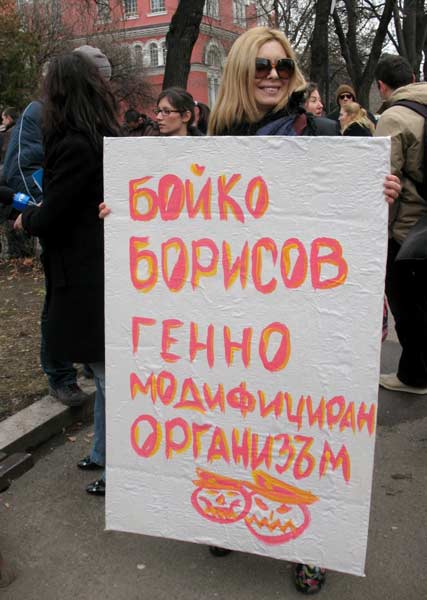
Bulgaria's legislation on Genetically Modified Organisms (GMO) has been carefully followed by the US Embassy in Sofia.
The information comes from several US diplomatic cables, (one by current US Ambassador in Sofia, James Warlick), which were released by WikiLeaks and their Bulgarian partner, the site for investigative journalism Bivol.bg.
According to the cables, GMO supporters in Bulgaria are actively backed and financed by the American Embassy, as Bivol writes.
In a cable, sent in 2006, Charge d'Affaires, Alex Karagiannis, informs the US Department of State that the main obstacle for the passing of more liberal GMO legislation has been opposition coming from the President of the Bulgarian Academy of Science (BAS), Ivan Juchnovski.

A diplomatic cable of the US embassy in Sofia, dated October 2, 2008, has been revealed on WikiLeaks, focusing on Bulgaria's energy dependence from Russia.
The report titled "BULGARIA AND THE ENERGY KNOT: SCENESETTER FOR OCT 7 VISIT OF SPE GRAY," has been sent by then US Ambassador in Sofia, Nancy McEldowney to Boyden Grey, at the time Special Envoy for European Affairs and Special Envoy for Eurasian Energy at the Mission of the United States to the European Union, ahead of his visit to Bulgaria.
The Bulgarian dependency is described by the Ambassador almost pornographically with the following words: "But the cartoon strip portraying a passionately eager Bulgaria in bed with the muscle bound duo of Gazprom and Lukoil is only partially true -- it is a tryst driven less by passion and more by a perceived lack of options."
The cable is revealed after the Bulgarian Government revoked the license of one of the "muscle bound lovers": the local refinery of the Russian oil giant Lukoil, who was forced to halt operations for at least a month and a half.
Тhe Director of the Bulgarian Customs Agency, Vanyo Tanov explained that the refinery cannot operate without the required electronic measuring devices Lukoil failed to install in its storage facilities, and can deal only with the fuels already outside the plant.

Bulgaria's State Agency for National Security (DANS) is probing within its authority revelations of the whistle-blowing site WikiLeaks that former Chief of General Staff, Nikola Kolev, has provided valuable information to the US Embassy in the beginning of 2003.
The information was reported by Prime Minister, Boyko Borisov, during parliamentary control Friday as a response to a question coming from the Member of the Parliament from the far-right, nationalist Ataka party, Pavel Shopov.
Borisov explained DANS does not have investigative functions, but if there is evidence confirming the Wikileaks report, this evidence would be turned to the Prosecutor's Office.
The cable in question was released on June 15 by WikiLeaks and provided to the project for investigative journalism www.bivol.bg.
Kolev, who is currently Chief of Staff of President, Georgi Parvanov, and the Presidential Office declined any comments at the time.
MP Shopov replied he was satisfied by Borisov's answer because details were not as important as the fact the case is being investigated.
Meanwhile, Bivol.bg commented they were still not able to find out the exact meaning of SIMO, which in another cable, has allegedly confirmed that Borisov was involved in major traffic in methamphetamines.
by Alexandre Lévy, Western Balkans Printed in Le Monde 03 July 2011 edition
Since the beginning of the Greek crisis, the issue of bank stability and in particular of the bank system in the neighboring countries had been raised insistently. An issue even more pertinent if we take into account the fact that Greece is one of the most important investors in the region, notably in this sector. So, in Bulgaria at least five important banks are headquartered in Athens (United Bulgarian Bank, Postbank, Piraeus Bank Bulgaria, Emporiki Bank Bulgaria and Alpha Bank Sofia), representing nearly 30% of the sector. And since the start of the crisis, those responsible have been busy with reassuring the public opinion and the social political class, particularly after concerns expressed publically in March, 2010 by Finance Minister, Simeon Djankov, about the possibility of siphoning of local funds by their parent bank.
On October 26, 2005, on the so-called “government route” on “Bulgaria” boulevard in Sofia, banker Emil Kuylev was gunned down. Immediately after the murder, the top people in the country – Interior Minister, Rumen Petkov, Chief Prosecutor, Nikola Filchev, and President Parvanov publically declared that Kyulev’s business was “clean.”
The American Ambassador in Sofia at the time, John Beyrle, however, has been of a different opinion since the same afternoon he sent to the State Department a report titled “TOP BULGARIAN MONEY LAUNDERER SHOT DEAD IN SOFIA” [05SOFIA1847]. He does not mention the name of the “top launderer,” but provides in the text a thorough biography and business portrait of Kuylev – a former policeman, who had used his connections in the services to create consulting businesses, and later a bank, in partnership with Michael Chorny, receiving a “sweetheart deal” from the State – the right to handle, through Roseximbank, all payments of the Bulgarian Tax Directorate and the Customs Agency, as well as the operations of the biggest tax-payers in the country; a founder of Vazrajdane Business Club along with Multigroup boss Iliya Pavlov (shot dead in 2003) and Vasil "The Skull" Bozhkov; a former advisor to President Georgi Parvanov and, (according to unconfirmed reports), a major political campaign sponsor of the National Movement for Stability and Prosperity (NDSV) party of former King and Prime Minister Simeon Saxe-Coburg, of the Bulgarian Socialist Party, BSP, and of Parvanov himself for his 2001 campaign – these are the traits of the image of one of the wealthiest people in Bulgaria.
Kyulev had applied significant effort to clean this image, even hiring an American lobbyist. Seemingly, the result had not been very convincing because, as the Ambassador points out, the Foundation for Fight against Human Trafficking, established by the banker, was suspected in money laundering.
Депешата [09ANKARA1794] е испратена од амбасадата во Анкара и се води како некласифицирана, а напишана е на 17 декември 2009 од тимот за логистика со наслов:
Министерството за Правда за OPDAT (Office of Prosecutorial Development, Assistance, and Training)
Кратко резиме:
Амбасадата во Анкара ќе биде домаќин на тридневна регионална работилница за контра-тероризам за Турција, Бугарија, Македонија, Албанија и Грција од 10 до 12 февруари 2010. Амбасадата во Анкара бара помош од амбасадите за да се осигура соодветно учество на настанот.
by Novinite.com

Bulgaria's former Chief of General Staff, Nikola Kolev, currently Chief of Staff of President, Georgi Parvanov, has provided valuable information to the US Embassy in the beginning of 2003.
The revelation comes from an US diplomatic cable, stamped as Secret, dated January, 10, 2003 and titled "Squaring the Lawyer's Circle – Leading Figures in Bulgaria's Ruling NMSP Party Come under Attack." The cable is signed by CDA Roderick Moore.
The cable was released by WikiLeaks and provided to the project for investigative journalism www.bivol.bg. It brings out new details about key figures from the party of former King and Prime Minister, Simeon Saxe-Coburg, National Movement for Stability and Prosperity (NMSP)
According to the cable, "Gen. Kolev has leveled charges of corruption within the Ministry of Defense, MOD, in a (thus far) still secret report delivered to the President and senior MOD leaders."
Kolev's name has emerged in connection with now former NMSP Defense Minister, Nikolay Svinarov.
The cable further tells about the so-called "Gnome" wiretapping scandal involving the then Chief Prosecutor, Nikola Filchev, the Speaker of the Parliament, Ognyan Gerdzhikov, the leader of the NMSP Parliamentary group, Plamen Panayotov, the Interior Minister, Georgi Petkanov, and Svinarov – all except the latter, known to be part of the powerful Lawyers' Circle.
The cable alleges they were all close to Saxe-Coburg's "notorious former Chief of Staff, Stoyan Ganev."
According to the cable, Svinarov also had ties with "reputed organized crime figure, Vasil Bozhkov."

Bulgarian PM Boyko Borisov refuted yesterday the Wikileaks revelations about his past ties to organized crime, metamphetamines traffic and his dependence from a shady businessman from Lukoil.
"I don't read Wikileaks" - he said before the media in The Hague, Netherlands, on 26th of May, where he opened the 7-th international meeting of Bulgarian media, organized by the Bulgarian news agency BTA.
Asked by journalists about his comment on the cable content, published by the Bulgarian web site Bivol.bg, the local Wikileaks partner, Borisov acknowledged he phoned the US Ambassador James Warlick, who said that the Wikileaks publications are "based on unconfirmed sources and it was futile to comment on them".
"As far as I know, they have not published anything positive about anybody yet. They also cite tabloids publications and comments of various political parties," Borisov said. "I don't read tabloids" - he concluded.
Later the same day, the US Embassy published a statement saying that "It is important to keep in mind that diplomatic cables are often preliminary and incomplete analyses of international affairs, and should not be seen as official representations of U.S. foreign policy"
US Ambassador to Sofia, Jonh Beyrle wrote the said cable on Borissov on May 9, 2006. The report’s confidentiality level is listed as SECRET/NOTFOR (NOT FOR FOREIGNERS), only one level below the highest TOP SECRET level, not available to Wikileaks.
The cable is one of the few from a total of 978 reports sent from Sofia, that have been checked and approved simultaneously by the Embassy’s political, military and security advisors, not just Ambassador Beyrle.
Borissov described himself as "Bulgaria's biggest asset"

"We must continue to walk a fine line between being used by Borisov's publicity machine and alienating an exceptionally popular and seemingly pro-American politician who may emerge as Bulgaria's next leader. In other words, we should continue to push him in the right direction, but never forget who we're dealing with."
This is the conclusion of a diplomatic report dedicated to now Bulgarian Prime Minister, Boyko Borisov, sent by former US Ambassador to Sofia, Jonh Beyrle on May 9, 2006. The report’s confidentiality level is listed as SECRET/NOT FOR FOREIGNERS, only one level below the highest TOP SECRET – cables classified as TOP SECRET are not available to Wikileaks.
The reasons for classifying the report are coded as 1.5 (b,d), meaning confidential sources have been used in its preparation.
The cable has another characteristic – from a total of 978 reports sent from Sofia, there are just a few that have been checked and approved simultaneously by the Embassy’s political, military and security advisors, not just Ambassador Beyrle.
"The Dirt"
This is how Beyrle titled the section focusing on Boyko Borisov’s criminal past. Incidentally, the paragraph has the "lucky" number 13, while in the brackets, after 13, the level of confidentiality is purposely listed as SECRET/NOFOR, which corresponds to the highest level of classified information for this cable.


Bulgaria held European elections in June 2009, followed by the national parliament elections in July. The main political players are analysed by the american ambassador in Sofia Nancy McEldowney in two cables sent to Washington DC and reported by the investigative journalism site Bivol, a local partner of Wikileaks. [09SOFIA301] [09SOFIA264]
The cables give a rough picture of a political landscape plagued by corruption, shady businessmen, vote buying and accused criminals running for MP.
Bulgarian media stressed the direct translation of the title "Garbage in, Garbage out", adding that not all of the Bulgarian MPs deserve to be named "garbage", but many of them are looking after their private interests first, through heavy lobbying. "Now, it's up to them to reject this qualification. With a radical change" - popular daily "Troud" wrote in an OpEd.
English language site Novinite stressed the comparison of Ataka (Attack) party and the ethnic Turkish Movement for Rights and Freedoms. They are each other's "best enemies", according to the cable.
"Local analysts say Ataka and MRF need each other to frighten their constituents into voting." the cable says.
Currently, Ataka is the ruling centrist-right GERB's only parliamentary ally.
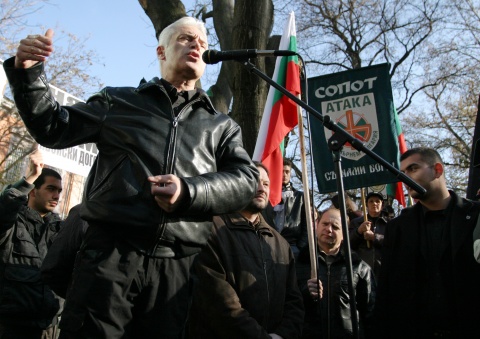
Diplomatic cables of the US embassy in Sofia have been revealed on WikiLeaks and provided to the project for investigative journalism www.bivol.bg, bringing out new details about the way Bulgaria's far-right, nationalist Ataka party and its leader, Volen Siderov, are viewed by American diplomats.
The text in English has also been published at the Balkanleaks site, an analogue of the notorious whistle-blowing WikiLeaks.
The first available cable on the subject has been sent on July 12, 2005, by then US Ambassador to Sofia, James Pardew, after it became known Ataka had secured seats in the Parliament as result of the general elections. In the cable, titled BULGARIA: EXTREME NATIONALIST PARTY ENTERS PARLIAMENT, the diplomat writes about the policies of Ataka and Siderov, seen by him as xenophobic and anti-semitic, points out Ataka's parliamentary group includes a significant number of former military and police officials, gives a summary of Siderov's biography and work as journalist, talks about other key figures in the party and and notes undisclosed sources have informed him the nationalists might have received funding from Overgaz Chief Sasho Donchev and Nove Holding owner Vassil Bozhkov aka The Scull.
In a cable, dated October 17, 2005, titled PROGRESS ON U.S. MILITARY ACCESS, BUT TOUGH ISSUES REMAIN, the then Charge d'Affaires of the US Embassy Jeffrey D. Levine points out the nationalists lead an anti-American campaign regarding US military bases.
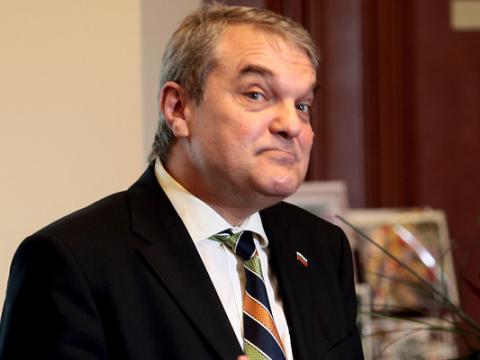
Former Interior Minister of Bulgaria (2005-2008), Rumen Petkov is presented as a "hard working, hard drinking", controversial figure, related to political corruption and russian intelligence in a WikiLeaks diplomatic cable released by the Wikileaks partner Bivol.bg also published on balkanleaks.eu
Before his appointment as a Minister, Petkov was the mayor of the central Bulgarian city of Pleven where he was "dogged by scandals, some serious and some -- like his late night arrest for urinating in a public fountain --simply illustrative of his unpolished style" - wrote the American ambassador in Sofia.
Rumen Petkov became one of the most influential personalities in the Bulgarian government under PM Stanishev (2005-2009).
His past associations with controversial figures may make it difficult for him to move against certain Organized Crime interests - the Ambassador John Bayrle reported. He also believes Petkov has "long been publicly associated with Russians who are either directly or indirectly affiliated with Russian intelligence,"
While Petkov was a Minister "The five largest organized crime groups in Bulgaria (TIM, VIS, SIC, Nove Holding, and Multigroup) ... generally operated with impunity," Bayrle stated.
Petkov resigned in April 2008 after a huge political scandal following the revelation that he met with The Galevi Brothers, alleged drug lords. Despite the strong evidence that Petkov protected alleged criminals and shady alcool business from justice, Petkov was never investigated by the prosecutor office.

Bivol.bg (partial translation)
Bulgarian Chief Prosecutor, Boris Velchev, has painted an apocalyptic picture of the state of the prosecution services in the country at a meeting with American Ambassador, John Beyrle, held soon after Velchev’s election to the post. This has been revealed in a cable written by Beyrle, dated February 7, 2006, and leaked by Wikileaks [06SOFIA198].
The prosecutor’s office under the leadership of Velchev’s predecessor, Nikola Vilchev, was described by the new Chief Prosecutor as "some kind of terrorist organization" used to settle political and business scores, but totally incapable of fighting crime.
Empty files and hostile deputies, who did not even want to talk to him, is what Velchev stumbled upon at the prosecution services. He had described his priority of cleansing the institution from corrupt prosecutors as "some kind of a war".
Velchev’s “war,” however, has implications beyond the borders of Bulgaria – it must lead to effective guilty verdicts of organized crime bosses, one of the top requirements of the EU, monitoring Bulgaria before its accession to the Union.
Facing the outrageous failure of Bulgarian prosecutors and law enforcement to collect sound evidence against the leaders of organized crime, the Chief Prosecutor declares, according to Bayrle, his equally outrageous plan to seek “a contract with the Courts.” Ambassador Beyrle explains this means appealing to judges to sentence criminal bosses “based on evidence that otherwise might not pass muster“.
Alexandre Lévy, Western Balkans
Des responsables français en armement ont certainement suivi le départ du Druzki, la frégate un peu vétuste que Sofia vient d'envoyer au larges des côtes libyennes dans le cadre de l'opération alliée contre le régime de Kadhafi. Car le Druzki aurait pu être une corvette de classe Gowind, l'une des quatre que la France comptait vendre à la Bulgarie au prix d'un milliard de dollars US - soit pratiquement le double du budget annuel de la défense dans ce pays. Qu'est-ce qui a fait capoter ce "contrat du siècle" inclus dans l'ambitieux partenariat stratégique entre les deux pays signé par Nicolas Sarkozy à Sofia, le 4 octobre 2007, quelques semaines après l'euphorie de la libération des infirmières bulgares?
A lire les télégrammes diplomatiques américains de cette époque, révélés par les sites Bivol et BalkanLeaks , les partenaires locaux de WikiLeaks (cf. infra), il apparaît que les Bulgares ont surtout voulu temporiser, soufflant le chaud et le froid, dans le but de ne pas froisser Paris qui a joué un rôle actif dans la libération des infirmières. Beaucoup de responsables bulgares, y compris des militaires de haut rang, ne sont pas dupes : ils considèrent dès le départ cette acquisition comme vouée à l'échec, ces corvettes françaises dernier cri étant considérées comme un luxe inutile pour la marine bulgare.
Mais, plus que tout, la lecture de ces câbles illustre les efforts que Washington déploie pour dissuader les Bulgares d'honorer ce contrat contraire, selon eux, aux intérêts stratégiques de Sofia. Et surtout, des Etats-Unis, qui font un intense lobbying en faveur de l'achat par la Bulgarie de matériel américain d'occasion - notamment des avions de combat multifonctions.
Réformes bulgares, opportunités américaines
Boyko Borisov complained about Putin to the Americans; RWE had been “sabotaged” to give up on Belene NPP project.
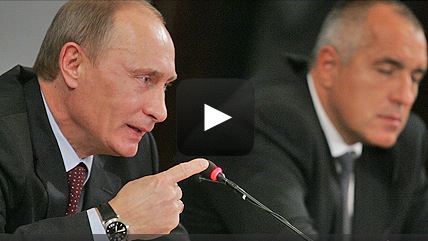
Bulgarians "risk being cold" this winter if the government did not move forward with the Russian energy projects. This is what Russian Prime Minister, Vladimir Putin said, off-the-record, to his Bulgarian counterpart, Boyko Borisov, during the summit in Gdansk in September, 2009. The tone of the sentence in question is not clear, we cannot judge if it was threatening enough, but obviously it seriously impressed Borisov in order for him to report it in a timely manner and for Putin’s words to find their place in the classified documents of the American diplomacy.
Borisov’s complaint about Putin’s attitude is described in a US diplomatic cable, dated October 5, 2009, released by Wikileaks [09SOFIA561]. The text does not elucidate if this has been a joke or a threat. On September 29, 2009, Borisov had asked the US government for assistance in the diversification of energy sources for Bulgaria.
“The cash-strapped new administration seeks not only to rid itself of projects of questionable commercial viability but also to increase its energy security through diversification,” the American diplomats believe.
The cable talks about the meeting between the Prime Minister and three large US energy companies, held on that same date. As a result, the government had made the commitment to engage in negotiations to use US technology to diversify its nuclear fuel supply and create a spent nuclear fuel storage facility.

A set of cables about Bulgarian energy business, published by the Wikileaks media partner Bivol.bg, discloses a realm of "energy mafia", murky intermediaries, connected with organized crime, and Russian financial interests.
The cables reveal how Russia was blackmailing Bulgarians to advance the construction of new pipelines for Russian gas and oil, and of a new nuclear power plant in Belene (the only Russian project of this type in EU).
Describing his September 1, 2009, meeting with Putin in Gdansk, Borissov said Putin implied (in an off-the-record remark) that Bulgarians "risk being cold" during the upcoming winter if Borissov did not move forward with the projects.
Bulgaria is 100% dependent from Russian gas and nuclear fuel and was the most affected country during the gas supply cuts in 2009.
Translation of the full analysis by Bivol.bg will follow shortly.
Theme by Danetsoft and Danang Probo Sayekti inspired by Maksimer